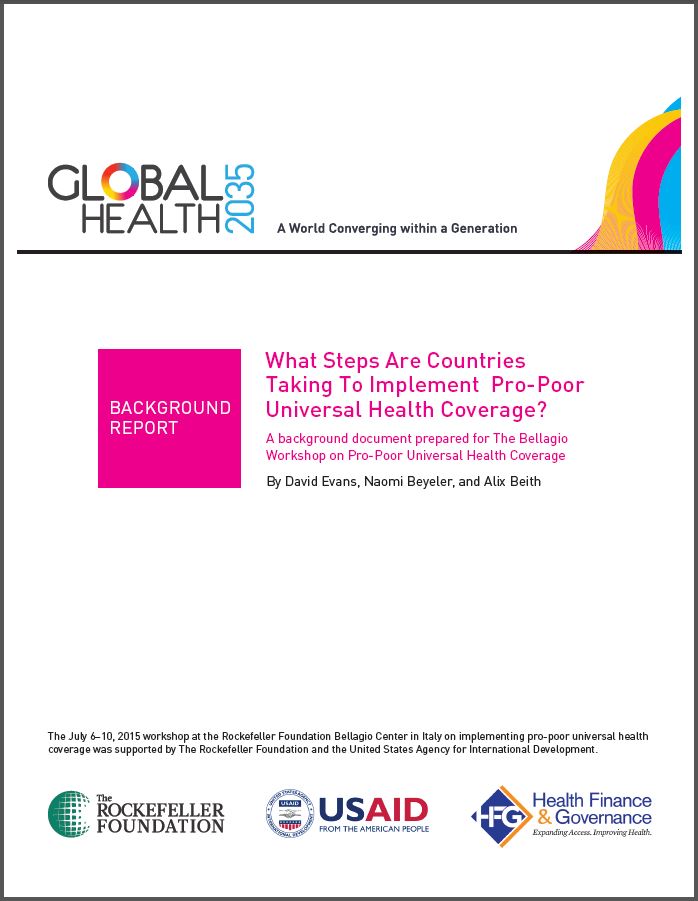What Steps Are Countries Taking To Implement Pro-Poor Universal Health Coverage?
Categories: Health Insurance (CBHI, SHI), Publications, Universal Health Coverage
Resource Type: Report
Authors: David Evans, Naomi Beyeler, and Alix Beith
Published: December 2015
 Resource Description: Universal Health Coverage (UHC) can be a vehicle for improved equity, health, the financial well being of households and, ultimately, development. Countries around the world are embarking upon health system changes that move them closer towards achieving UHC. Much has been written about what steps countries have taken and are currently taking to: 1) set and expand guaranteed services, 2) develop health financing systems to fund guaranteed services and ensure financial protection, 3) ensure high-quality service availability and delivery, 4) improve governance and management of the health sector, and 5) strengthen other aspects of health systems to move closer to UHC. As background for a USAID- and Rockefeller Foundation-supported meeting on UHC implementation, held July 6–10, 2015 in Bellagio, Italy, we reviewed this body of literature, and conducted interviews with global UHC implementers and academics.
Resource Description: Universal Health Coverage (UHC) can be a vehicle for improved equity, health, the financial well being of households and, ultimately, development. Countries around the world are embarking upon health system changes that move them closer towards achieving UHC. Much has been written about what steps countries have taken and are currently taking to: 1) set and expand guaranteed services, 2) develop health financing systems to fund guaranteed services and ensure financial protection, 3) ensure high-quality service availability and delivery, 4) improve governance and management of the health sector, and 5) strengthen other aspects of health systems to move closer to UHC. As background for a USAID- and Rockefeller Foundation-supported meeting on UHC implementation, held July 6–10, 2015 in Bellagio, Italy, we reviewed this body of literature, and conducted interviews with global UHC implementers and academics.
Less well documented in the literature is experience with how countries have tackled and are tackling some of the difficult—often sensitive—questions around implementing UHC while ensuring coverage of the poor at no or low cost. For example, how are countries able to build and sustain political commitment for UHC over time, and manage opposition to pro-poor service delivery? How are they able to secure and maintain the necessary long-term health system finance and move away from direct out-of-pocket payments at the same time? How do countries ensure adequate institutional capacity, and expand services where this capacity is weak? How can they best engage civil society and the general public to ensure health systems are responsive to population needs?
These “how” questions were at the core of the 2015 Bellagio meeting discussions. Two documents—a policy report from the Bellagio meeting that forms the beginnings of an evidence-base around the “how” questions, and a short practice brief summarizing key messages from the Bellagio meeting—both complement this paper. These documents together are designed to help ministries of finance and health and other stakeholders think through how to best ensure a pro-poor focus and address common challenges as they implement steps towards UHC. These materials can also provide insights for the international and research communities on steps that their communities can take to most effectively support LICs and MICs as they work towards achieving UHC.
Download
Related:
- Policy Brief: What Steps Are Countries Taking To Implement Pro-Poor Universal Health Coverage?
- Practice Brief: Implementing Pro-Poor Universal Health Coverage – Lessons from Country Experience
- Policy Report: Implementing Pro-Poor Universal Health Coverage – Lessons from Country Experience
- Journal Article: Implementing Pro-Poor Universal Health Coverage



